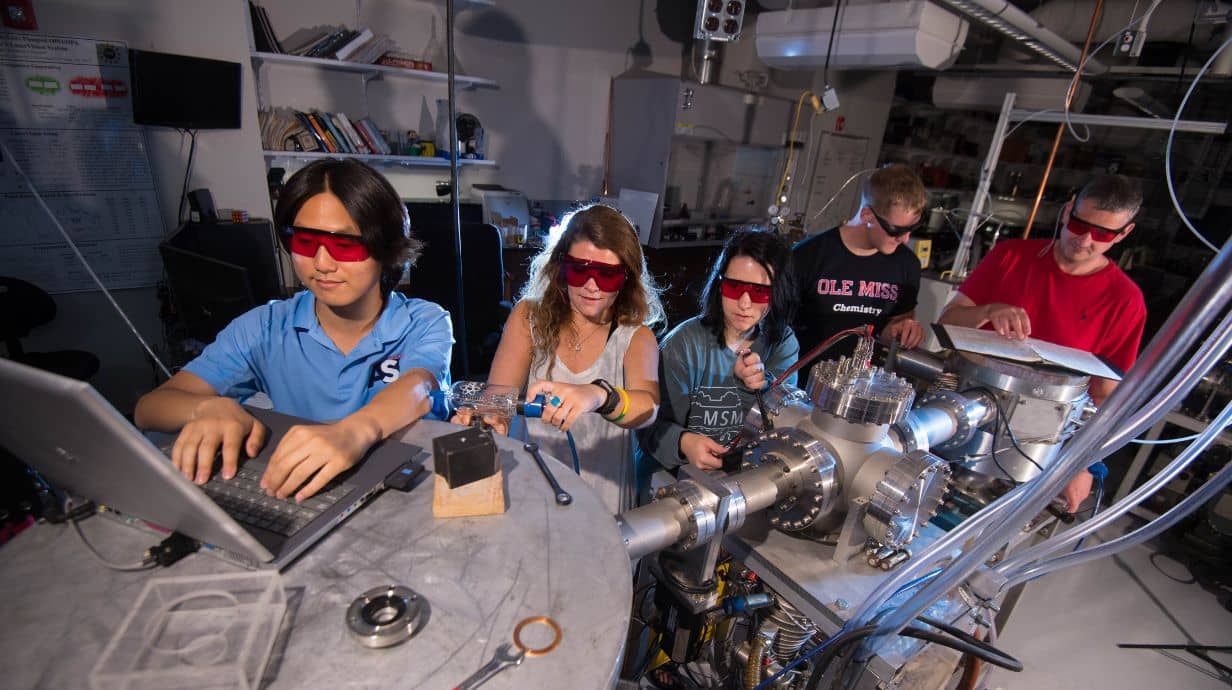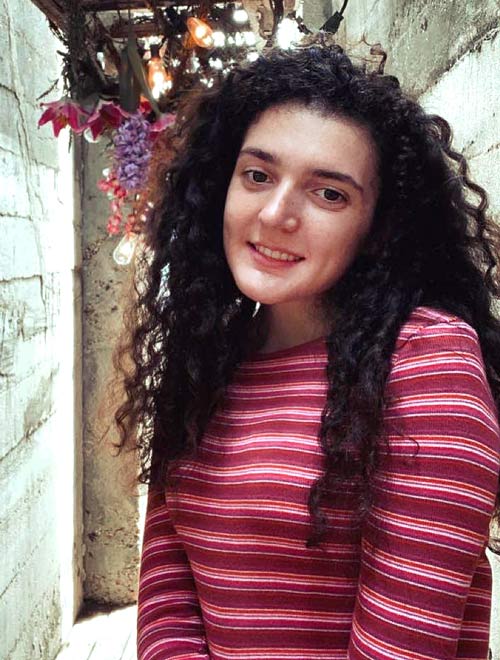Bachelor of Science in Chemistry
Pursue new knowledge through a broad range of the chemical sciences.

“The professors really care about their research and recruit students, even freshmen. You can develop an awesome support network of chemistry majors."
Yasmeen Abdo (B.S. in Chemistry, Biochem emphasis; minor in Math ‘19)
Internal Medicine Intern, Rutgers
About this Program
The Department of Chemistry and Biochemistry in the College of Liberal Arts offers the B.S. in Chemistry. To be admitted to this degree program, students must meet certain prerequisites.
Chemistry majors are introduced to the electronic theory of matter, organic and inorganic chemical reactions, quantum and statistical mechanics, thermodynamics, chemical kinetics, the kinetic theory of gasses, and the properties of solutions. They receive training in the theory and use of state-of-the-art chemical instrumentation, the principles of data collection and analyses, and the techniques used for the professional presentation of scientific results.
Students may choose from one of the optional emphases:
- Biochemistry
- Chemical Physics
- Environmental Chemistry
B.S. vs B.A.
Students can choose between the Bachelor of Science in Chemistry and the Bachelor of Arts in Chemistry.
- The B.S. degree is accredited by the American Chemical Society (ACS). It is more focused on math and science and requires more courses for the major.
- The B.A. degree has a wider and deeper general education foundation and allows greater compatibility with other areas of study. It requires a minor field of study or double major.
Value of a Chemistry Degree
A chemistry degree empowers and prepares students to deal with complexity and change through a broad knowledge of the world. They gain key skills in communication, problem-solving, and working with a diverse group of people.
Related careers in chemistry include:
- Chemical and materials research
- Medical research
- Pharmacology
- Toxicology
- Health care
- Pharmacy
- Law
- Policy
- Environmental areas
Interested in more chemistry careers? Check out the the American Chemical Society for more information.
On this Page…
Program Information
Program Type
Major
Minor
Area of Study
Sciences, Mathematics, and Technology
School
Duration
4 years
Degree
B.S. in Chemistry
Program Location
Emphases
Biochemistry;
Chemical Physics;
Environmental Chemistry
Required Credit Hours
120
Degree Requirements
See the information below on the chemistry major and minor. For a full description, visit the online catalog.
To be admitted to the degree program and enroll in the required first chemistry course for the major or minor, students must meet one of the following prerequisites:
ACT math subscore of 24 (SAT 580)
ALEKS online math placement test score of PPL 76
Grade of A or B in Chem 101 at the University of Mississippi
Grade of A or B in Math 121: Algebra and Math 123: Trig
Grade of A or B in Math 125: Basic Math for Science and Technology
Students in the B.S. in Chemistry complete 50 credit hours of courses.
- Chem 105/106: General Chemistry I, II with labs
- Chem 221/222: Elementary Organic Chemistry I, II with labs
- Chem 314: Quantitative Analysis
- Chem 331: Physical Chemistry I
- Chem 332: Physical Chemistry II
- Chem 337: Physical Chemistry Laboratory
- Chem 401: Inorganic Chemistry
- Chem 402: Inorganic Chemistry Laboratory
- Chem 423: Organic Analysis
- Chem 469: Intro to Instrumental Analysis
- Chem 471: Biochemistry I
- Chem 463: Senior Research and Discovery (for two semesters)
Two advanced courses from:
- Chem 512: Advanced Instrumental Analysis
- Chem 514: Fundamentals of Electrochemistry
- Chem 519: Chemical Separations
- Chem 527: Adv. Organic Chemistry, Structure Mechanism
- Chem 528: Adv. Organic Chemistry, Structure Synthesis
- Chem 529: Stereochemistry
- Chem 530: Adv. Organic Synthesis
- Chem 531: Adv. Physical Chemisry, Quantum Chemistry
- Chem 532: Chemical Thermodynamics
- Chem 534: Physical Biochemistry
- Chem 536: Adv. Physical Chemistry, Reaction Dynamics
Additional Requirements:
- Phys 211/212: Physics for Science & Engineering I, II with labs
- Math 261: Unified Calculus & Analytic Geometry I
- Math 262: Unified Calculus & Analytic Geometry II
- Math 263: Unified Calculus & Analytic Geometry III
- Math 264: Unified Calculus & Analytic Geometry IV
- One of the following math courses
- Math 319: Introduction to Linear Algebra
- Math 353: Elementary Differential Equations
- Math 375: Introduction to Statistics I
To earn the Biochemistry emphasis, students complete
- Chem 471, 472: Biochem I & Lab (4 hours)
- Chem 473: Biochemistry II (3 hours)
- One course chosen from
- Chem 580: Molecular Biochemistry I
- Chem 581: Molecular Biochemistry II
- Bisc 333: General Microbiology
- Bisc 336: Genetics
To earn the Chemical Physics emphasis, students complete the following courses.
2 courses from the following:
- Chem 531: Advanced Physical Chem., Quantum Chem.
- Chem 532: Chemical Thermodynamics
- Chem 536: Advanced Phys. Chem., Reaction Dynamics
- Chem 544: Chemical Applications of Group Theory
- Chem 563: Applied Spectroscopy
1 physics or astronomy course from:
- Phys 303: Physical Theory and Techniques
- Phys 308: Mathematical Physics
- Phys 315: Radiation Science
- Phys 317: Introduction to Modern Physics I
- Phys 319: Optics
- Phys 321: Electronics
- Phys 401: Electromagnetic Theory I
- Phys 422: Digital Electronics & Microprocessors
- Astr 325: Astrophysics
To earn the Environmental Chemistry emphasis, students complete the following courses.
- Chem 512: Adv. Instrumental Analysis
One advanced course from:
- Chem 554: Analytical Environmental Chemistry
- Chem 593: Advanced Special Topics in Chemistry
- Bisc 322: General Ecology
- Bisc 451: Ecotoxicology
- Engr 540: Environmental Organic Transport Phenomena
- G E 503: Environmental Geochemistry
- Phcl 347: Introduction to Environmental Toxicology
A minor in Chemistry consists of 19-20 hours of courses.
- Chem 105: General Chemistry I
- Chem 106: General Chemistry II
- Chem 115: General Chemistry Laboratory I
- Chem 116: General Chemistry Laboratory II
- Chem 221: Elementary Organic Chemistry I
- Chem 222: Elementary Organic Chemistry II
- Chem 225: Elementary Organic Chem. Laboratory I
- Chem 226: Elementary Organic Chem. Laboratory II
- 3-4 hours at the 300 level or higher OR BMS 343: Biochemical Foundations of Therapeutics
What is Chemistry?
Connect with a Chemistry Major
What can I do with a chemistry degree?
- Patents Department, Coca-Cola
- Teacher, Madison Ridgeland Academy
- Chair of the Department of Medicine, Emory University
- Research Associate, University of Michigan
- Faculty, Northwest MS Community College
- Manager of Mass Spectrometry, Harvard
- Medical Director, Baptist Memorial Hospital
- Physician, Tupelo Medical Group
- Owner/Surgeon, Mass. Cosmetic Surgery
- Psychiatrist, East MS State Hospital
- State Training Coordinator, MS Public Health Lab
- Lab Research Chemist, US Army Research Lab
- Lab Refining Manager, Amoco Oil
- Executive Therapeutic Specialist, GlaxoSmith-Kline
- Senior Research Chemist, DuPont
- Manager, Lockheed Martin
Next Steps
Explore Affordability
We have a variety of scholarships and financial aid options to help make college more affordable for you and your family.
Apply to the University of Mississippi
Are you ready to take the next step toward building your legacy?





